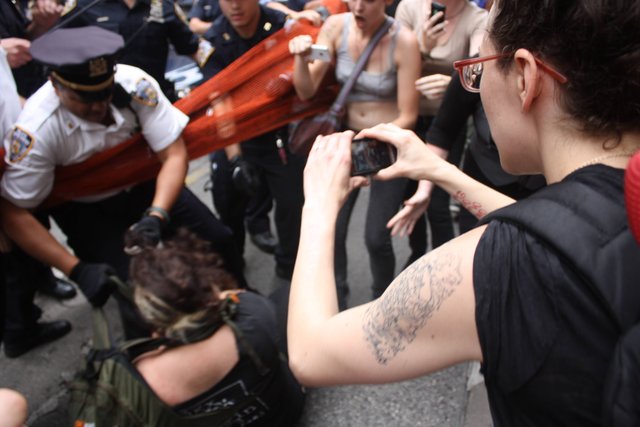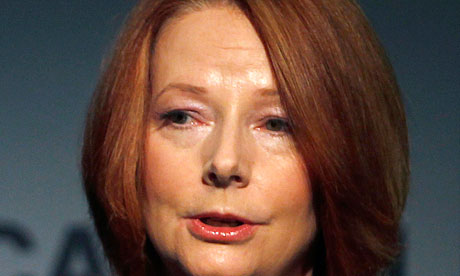Protesters at the "Occupy Wall Street" demonstrations in and around New York City's Financial District are being met with increasingly harsh police response. A growing number of videos show clashes between NYPD and activists, with police using tasers and mace on demonstrators.
Here are several of the videos making the rounds today: one, two, three.
If I'm reading the sequence of events in the video above correctly, two peaceful female protesters were first penned in by police, then at least one of the young women is sprayed directly in the face at close range with pressurized mace. She then falls to her knees, and repeatedly screams in pain.
There's an ABC News report about this video here. And Evan Fleischer has been gathering news, videos, and relevant links here. Below, from the Occupy Wall Street website: "This is a photo of a white-collar police officer reaching over a barricade and ripping a young woman's hair out."

80 Arrested as Financial District Protest Moves North
By COLIN MOYNIHAN NEW YORK TIMES
The police made scores of arrests on Saturday as hundreds of people, many of whom had been encamped in the financial district as part of a lengthy protest, marched north to Union Square. As darkness fell, large numbers of officers were deployed on streets near the encampment in Zuccotti Park, at Broadway and Liberty Street, where hundreds more people had gathered.
Paul J. Browne, the Police Department’s chief spokesman, said in a statement, “There were approximately 80 arrests, mainly for disorderly conduct by individuals who blocked vehicular and pedestrian traffic, but also for resisting arrest, obstructing governmental administration and, in one instance, for assault on a police officer.”
Protest organizers estimated that about 85 people were arrested and that about five were struck with pepper spray. Among those was Chelsea Elliott, 25, who said that she was sprayed after shouting “Why are you doing that?” as an officer arrested a protester at East 12th Street.
“I was on the ground sobbing and couldn’t breathe,” she said. The continuing protests, against a financial system that participants say favors the rich and powerful over ordinary citizens, started last Saturday and were coordinated by a New York group called the General Assembly.
Many of those taking part have slept in Zuccotti Park, which is private, using it as a base. In the early afternoon hundreds of people left the park and moved north toward Union Square. Witnesses said that for much of the route, protesters spilled from sidewalks onto streets and added that the police used long orange nets at Fifth Avenue and 14th Street in an apparent attempt to block the march from proceeding.
Many marchers, however, detoured and entered Union Square before eventually turning south again. Video showed a confusing scene as protesters went south on University Place, where motor vehicles run north.
At 12th Street the orange nets again were used, this time to box in protesters between University Place and Fifth Avenue. About 3 p.m., more than two dozen people sat, handcuffed, on the sidewalk.
Nearby, two other protesters standing handcuffed on Fifth Avenue told a reporter that they had both been arrested on sidewalks and were not aware of having broken any law.
“They put up orange nets and tried to kettle us and we started running and they started tackling random people and handcuffing them,” said Kelly Brannon, 27, of Ridgewood, Queens. “They were herding us like cattle.”
Next to her, David Smith, from Maine, said that he had been chanting “Let them go” as people were handcuffed, and was then arrested by a senior officer who told him that he was being charged with obstructing governmental administration.
After his arrest, one protester posted a Twitter message about his experiences from a bus taking him downtown.
@DustinSlaughter there’s 50+ of us arrested in a caravan, netted & maced by police after standing on sidewalk where they told us to
Many demonstrators made their way back down to Zuccotti Park, where they were joined by new arrivals. “Right now we are more determined than ever that what we are doing is necessary and correct,” said Patrick Bruner, a spokesman for the protesters.
New rules posted in the park on Saturday seemed aimed at the protesters. In addition to bicycle riding, camping gear and sleeping bags were now also banned.
Elizabeth A. Harris, Rob Harris and Meredith Hoffman contributed reporting.


